|
|
|
Sort Order |
|
|
|
Items / Page
|
|
|
|
|
|
|
| Srl | Item |
| 1 |
ID:
168253
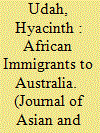

|
|
|
|
|
| Summary/Abstract |
The purpose of this paper is to examine the employment experiences of immigrants of African background in the Australian labor market. Drawing on the findings from a qualitative study conducted in South East Queensland, the paper identifies several barriers and challenges faced by Africans to meaningful employment and labor market success. The paper indicates the need to develop targeted policies to eliminate employment discrimination, reduce barriers to meaningful employment for good settlement and successful integration of African immigrants to Australia.
|
|
|
|
|
|
|
|
|
|
|
|
|
|
|
|
| 2 |
ID:
168252
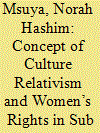

|
|
|
|
|
| Summary/Abstract |
This article discusses the challenges of the realization of women’s rights in relation to the concept of culture relativism in sub-Saharan Africa. It examines how the concept of culture is misconstrued with a traditional hierarchy and patriarchy approach that intervenes in the realization of women’s rights in sub-Saharan African states. Many societies are concerned that the promotion of gender equality would interfere with local culture; hence they feel that gender equality should not be promoted for ethical reasons. Women have been left with the unpleasant situation of choosing between their rights or their culture. Through secondary analysis and a critical review of the literature, the article engages in the debate on cultural diversity and gender equality, to challenge the existing stereotypes in sub-Saharan African cultures. It argues that traditional and cultural practices should adhere to the values of equality and human rights. The article proposes that cultural considerations will have to yield whenever a clear conflict with human rights norms becomes apparent.
|
|
|
|
|
|
|
|
|
|
|
|
|
|
|
|
| 3 |
ID:
168255
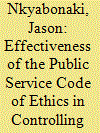

|
|
|
|
|
| Summary/Abstract |
Ethical values are core elements towards efficiency and effectiveness of the public service. Tanzania adopted the public service code of ethics as a behaviour guiding tool to public servants against maladministration practices. The study intended to measure the effectiveness of the public service ethics code as a tool to promote good governance for effective delivery of public service. The study qualitatively analysed the status of how an ethics code may control corruption in the public service. The findings from Toangoma Ward in a study conducted from June to September, 2017 revealed that the principles of a public ethos are not adhered to due to the ecology of public sector that includes, under pay, weak monitoring and evaluation of performance and the culture of nepotism in the public sector. Therefore, these weaknesses have made the public service ethos to be a myth and a failure in the management and provision of social services in Tanzania. The persistence of corruption in the service sectors has continued to ruin and damage the quality of services. The study recommends that the public sector is to be overhauled in terms of promoting best practices such as good pay, meritocracy in recruitment and promotions to higher managerial positions.
|
|
|
|
|
|
|
|
|
|
|
|
|
|
|
|
| 4 |
ID:
168251
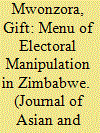

|
|
|
|
|
| Summary/Abstract |
Scholars have long been interested in investigating why and how ruling parties manipulate elections in Africa and elsewhere. Despite the importance of such a subject, much remains unknown about the role of incumbents in strategically manipulating electoral processes and outcomes in by-elections in particular. Debate rages on as to whether ruling parties rely exclusively on coercive methods or, in addition, make use of non-repressive methods. In seeking to contribute to addressing this matter, we draw upon a case study of two by-elections held in 2017 in rural constituencies in Zimbabwe, namely Bikita West and Mwenezi East. Our research involved evidence gleaned through personal observations, review of grey literature and personal reflections. Our study established that competitive authoritarian regimes as found in Zimbabwe combine both methods when manipulating by-elections. However, we show that there has been a shift away from heavy reliance on organised acts of naked political violence on the part of the ZANU-PF ruling party since the disputed 2008 elections and in the subsequent 2013 and post-2013 by-elections. Thus, there appears to be an inclination towards the use of subtle methods, including patronage, assisted voting, use of traditional leadership and appealing to the rendition of past violence. Nonetheless, even these methods impinge on the credibility of not only by-elections but also national elections in Zimbabwe.
|
|
|
|
|
|
|
|
|
|
|
|
|
|
|
|
| 5 |
ID:
168257


|
|
|
|
|
| Summary/Abstract |
This study investigates the symbolic attributes of power relations within the built environment of the walled city of Nicosia and contributes to the interpretation of generated meaning. The fundamental aim of this study is to provide a comprehensive explanation and description of how power as a socially constructed phenomenon aids in defining the language of the city and architecture. Studies of the built environment in relation to power discourse are a continuous process, and due to the subjectivity of interpretations, this study adopted the epistemological stance of constructivism. Based on deductive reasoning, this study hypothesises that power aids in defining the language and imageability of the city, and the results have verified the propositions. The case study of this research was diachronically analysed and focused on the socially-constructed symbolic meaning generation, within the framework of interpretivism. In order to analyse the city, a conceptual approach was developed. Two main approaches that support the research hypothesis were established: the language of the city; and imageability of the city. The imageability of the city was based on the five elements of the city, published in 1960. However, due to the context of this research, three of the elements that fully supported the research aim and objectives were selected, namely, landmark, district and path. The two main conceptual approaches were tied to power relations within the built environment based on the theoretical frameworks of: Markus; Dovey; and Njoh. In conclusion, the walled city of Nicosia exhibits symbols of ‘power over’ such as segregation, seduction, manipulation, and authority. The results have verified the proposition that power aids in defining the language and imageability of a city, thereby transforming the city and its inhabitants.
|
|
|
|
|
|
|
|
|
|
|
|
|
|
|
|
| 6 |
ID:
168258
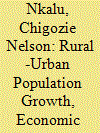

|
|
|
|
|
| Summary/Abstract |
The study analyses the dynamic effect of rural-urban relationship, economic growth and urban agglomeration in sub-Saharan Africa with a view of testing the validity of the Williamson-Kuznets hypothesis. The study utilized panel data analysis with pooled ordinary least squares with secondary annual time series data ranging from 1970 to 2017 and sourced from the World Bank database. The study equally employed both homogeneous and heterogeneous panel unit root tests to verify the stationarity of the panel data variables before estimating the model. However, the estimation result revealed that both rural and urban population growth has a negative impact as well as a statistically significant result on urban agglomeration in sub-Saharan Africa. The result equally showed a negative impact but statistically insignificant relationship between urban agglomeration and foreign direct investment. Also, a statistically significant and positive relationship was recorded between economic growth and urban agglomeration, thereby validating the Williamson-Kuznets hypothesis in sub-Saharan Africa. Based on the findings, the study among other numerous policy recommendations calls for a critical review of policies in the economies of sub-Saharan Africa to ensure effective utilization of the foreign direct investment net inflows towards initiating more and robust development projects both in the cities and rural areas, as well as expand the provisions of the basic infrastructural facilities and development projects. This would aim to curtail any perceived and unwarranted influx to the urban areas by the rural dwellers, hence they do not contribute significantly to growth in urban agglomeration.
|
|
|
|
|
|
|
|
|
|
|
|
|
|
|
|
| 7 |
ID:
168254


|
|
|
|
|
| Summary/Abstract |
Why did decade-long US security cooperation and counterterrorism engagements in Nigeria fail to bring down Boko Haram or at least weaken its terrorist structures and transnational spread? There is little agreement among scholars on the impact and implications of US security engagements in Nigeria on the military’s counterterrorism strategies. I argue that disconnects between the components and dimensions of US–Nigeria security cooperation are implicated in the intractability of Boko Haram insurgency in Nigeria. I develop the concept of ‘unwilling’ and/or ‘less cooperative states’ to underscore the vulnerability of counterterrorism-assistance-seeking states and their disconnectedness/asynergy with their foreign counterterrorism partners.
|
|
|
|
|
|
|
|
|
|
|
|
|
|
|
|
| 8 |
ID:
168256
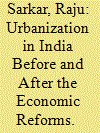

|
|
|
|
|
| Summary/Abstract |
The main objective of this paper is to analyze the recent trends and patterns of urbanization before and after the economic reforms in India. In addition, the paper explores the emerging patterns of urban growth and captures the changes through development indicators based on the available data from the Census of India and National Accounts Statistics. The study employs an exponential growth rate and a linear model for determining the pace of urbanization, which is then plotted on a scatter diagram. It is surprising to note that wherever urbanization was expected to accelerate, it has instead slowed down. Economic reforms have been not uniformly implemented because of the faulty national economic policy which has discouraged the growth of urban employment and is a cause for concern that requires political attention. The study concludes that economic reforms are necessary for accelerating urbanization, promoting small and medium-sized urban areas, human capital, socio-cultural mobility, and plans for eco-friendly green cities.
|
|
|
|
|
|
|
|
|
|
|
|
|
|
|
|
| 9 |
ID:
168250
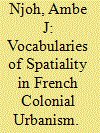

|
|
|
|
|
| Summary/Abstract |
The study analyses toponymic practices in two colonial spaces on two continents. The colonial spaces, Dakar and Saigon, were capitals of the Federation of French West Africa and French Indochina, respectively. Toponymy is used as a tool to articulate socio-cultural and political power in both spaces; also, streets were christened after French military, politico-administrative and religious personalities. Two differences are noted. First, streets in colonial Saigon were named after French military heroes and clergymen, while streets in Dakar were named after French political luminaries. Second, post-colonial Saigon witnessed efforts to re-appropriate the city’s identity, but not so in Dakar.
|
|
|
|
|
|
|
|
|
|
|
|
|
|
|
|
| 10 |
ID:
168259
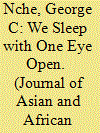

|
|
|
|
|
| Summary/Abstract |
In instances of insecurity in many societies, churches “also” suffer. Yet there is a dearth of literature exploring the experiences of churches in connection with situations of insecurity. This study, therefore, explored the experiences of churches in the face of the high rate of insecurity in Rivers State, Nigeria. Information was elicited from 16 church leaders of different denominations in different communities in Rivers State. Using a descriptive narrative approach, the study found that churches’ experiences in some communities in the state are reflections of helplessness and despair due to the incidences of cultism, kidnapping, armed robbery, etc. Many churches in some of the embattled communities have been deserted or left with a few older people. This has had negative impacts on evangelism and the churches’ economy, with the clergy at the receiving end. The implications of findings for the government and churches are discussed.
|
|
|
|
|
|
|
|
|
|
|
|
|
|
|
|
|
|
|
|
|